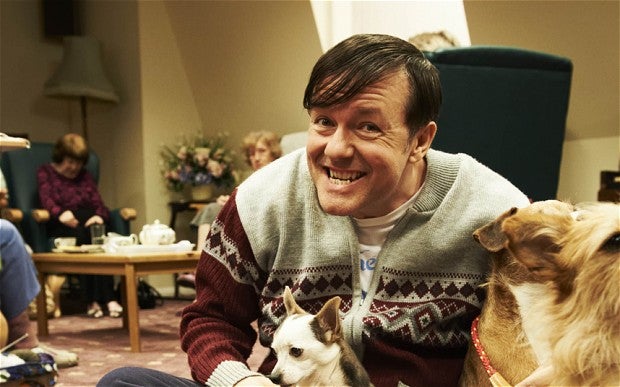TV review: Ricky Gervais' self-congratulating new show Derek, Channel 4
Eyes Down! The Story of Bingo, BBC4

Your support helps us to tell the story
From reproductive rights to climate change to Big Tech, The Independent is on the ground when the story is developing. Whether it's investigating the financials of Elon Musk's pro-Trump PAC or producing our latest documentary, 'The A Word', which shines a light on the American women fighting for reproductive rights, we know how important it is to parse out the facts from the messaging.
At such a critical moment in US history, we need reporters on the ground. Your donation allows us to keep sending journalists to speak to both sides of the story.
The Independent is trusted by Americans across the entire political spectrum. And unlike many other quality news outlets, we choose not to lock Americans out of our reporting and analysis with paywalls. We believe quality journalism should be available to everyone, paid for by those who can afford it.
Your support makes all the difference.If you'd asked me, I wouldn't have brought Derek back for a series. To my mind, the pilot of Ricky Gervais's comedy about an assistant in a retirement home had already fully explored its awkward – and testing – balance of comedy and emotion. But then again, I didn't get The Office on my very first viewing, a series that confronted audiences with a similarly unlabelled mix of empathy and mockery.
Anyway, never mind what I think, Derek is back, bringing with it the same anxieties that the pilot raised. The issue, put simply, is whether it’s all right for a comedian to pretend to be a bit dim. And in one sense the answer is obvious. If it wasn’t, most of the comedies we know and love would have to go at a stroke. But then what if the level of mental challenge falls outside the parameters of day-to-day foolishness and into the realm of the clinical? What if there’s a label for this kind of dimness?
Gervais has had trouble with labels before. It took him a shamefully long time to concede that the word “mong” is a bully’s weapon. And as if to acknowledge that, Derek sidesteps every attempt to pin a label on its central character. “Is he handicapped?” asks a council inspector, looking round the care home with a view to closing it down.
“Yeah. He’s too kind for his own good,” the care-home manager Hannah snaps back. Then, when he’s asked if he’d agree to be tested for autism, Derek conducts a guileless catechism. “If I am ’tistic, will I die?.” No, he’s told. “So will that change me in any way, would I be the same person?” he asks. “Yes,” Hannah reassures him. “Don’t worry about it then,” says Derek nonchalantly. It’s a good point, though only because Derek is in a place that meets all his needs already. “I loves it here...all my favouritest people are here,” he says, in a good example of the way much of his dialogue threatens to topple into the twee.
We are expected to laugh at Derek at times – at his obsession with establishing the outcomes of surreal animal combats (“but what if the chimp had a gun?”) and at his indifference to routine human prevarications. I fear we may be expected to laugh at his old man’s shuffle and gawping mouth too, though I can’t. But the comedy also bends over backwards to advertise its tender-heartedness.
There’s a novel hanger-on in the care home, a lubricious alcoholic called Kevin who seems to be present to test our powers of forgiveness. When he goes out with Derek to drum up signatures for a petition protesting against the home’s closure, he treats it as a pulling opportunity. “I think I do stand a chance with you, if I get you a bit pissed up and teary,” he tells an elegant Hampstead mother, after conceding that her daughter is out of his league. Kevin is revolting, in truth, and his acceptance in this idyll seems intended as a rebuke to our own disapproval.
Further reassurance comes in the form of a noodling piano on the soundtrack from time to time, the aural equivalent of a subtitle reading “Relax. We care”. Oddly, in fact, it’s Derek’s redeeming qualities that are the hardest to take – a sense of self-congratulation at the refinement of its own sentiments that has a little bit of the bully in it too.
The commentary for Eyes Down! The Story of Bingo claimed that, “It would be impossible to grow up in Britain and not know a single bingo call.” I doubt that frankly, but this was an enjoyable slice of social history anyway, chronicling bingo’s transformation from mild diversion to a very big business indeed. And a real passion too. One woman here plans to have the congregation play bingo at her funeral. I hope someone fills in a card for her.
Join our commenting forum
Join thought-provoking conversations, follow other Independent readers and see their replies
0Comments